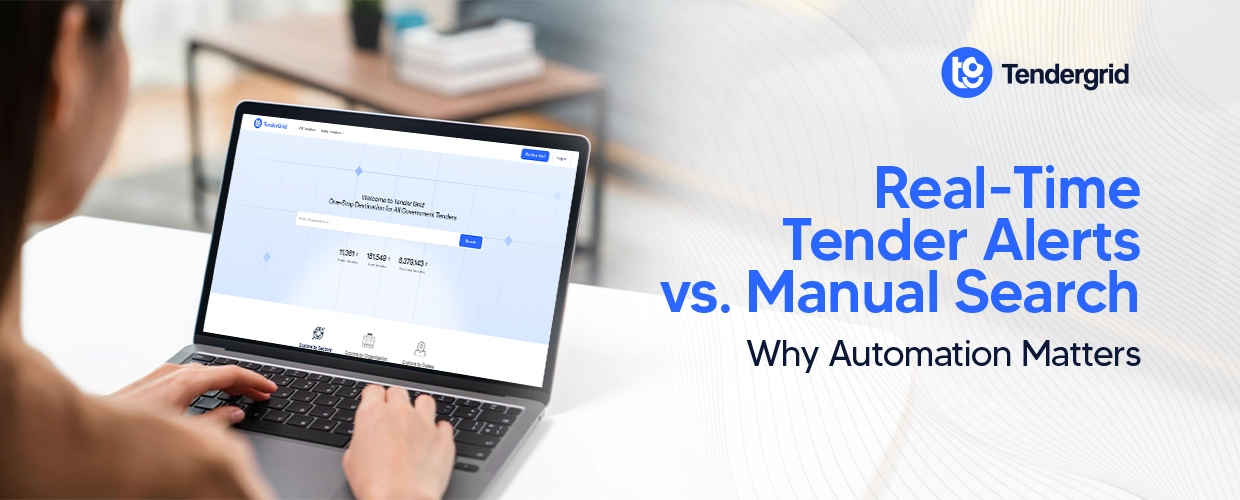Imagine sitting at your desk at 9:00 am on a Monday morning. You are simply sipping your coffee, and then suddenly you think of searching through five different government websites for tender updates. Then you get to know that, one site is under maintenance. Some other websites test your patience and take more than 5 minutes to load. Another website doesn’t even have the search filter, which blocks your liberty for precise and relevant searches. And, this is not it, even after so many hurdles, when you come across relevant tenders, you find out that deadline is very close and you don’t even have the required documents.
In the ever-evolving world of online procurement, time is no longer just money it’s opportunity, reputation, and growth rolled into one. As businesses scale, the traditional approach to tender discovery, manual search, starts to feel like rowing a boat with a spoon. This is where real-time tender alerts shine, and why automation is no longer a luxury but a necessity.
The Problem with Manual Search
1. Time-Consuming and Tedious
You might have noticed that searching tenders manually often means that there is a need to visit various eTendering portals. It means you have to check for updates by filtering through irrelevant notices, downloading documents, and tracking deadlines, all by yourself. This process not only demands manual labour but also has a higher chance of errors.
No matter you have a huge team dedicatedly working day and night and manually searching through thousands of tender-related websites. All this hard work and labour go in vain, as searching through numerous sectors, regions and according to funding agencies becomes very hectic. Now, just multiply this as per daily targets, and you will find out that this many hours have been wasted on something that could be done in seconds with the right approach and resources.
2. Human Error and Missed Opportunities
Tender notices are often published without prior notice or updates. Relying on human vigilance increases the risk of missing lucrative bids. A missed tender today could mean losing a multi-crore opportunity tomorrow.
3. Limited Reach
No matter how dedicated your team is, manual search restricts you to a finite set of platforms. What about niche sector tenders? International funding agency RFPs? Or emerging markets adopting digital procurement?
Automation to the Rescue: Real-Time Tender Alerts
Real-time tender alert systems are like having an ever-awake, ultra-efficient research assistant who knows exactly what you need and serves it to you before you even ask.
1. Speed and Precision
The feature of automation on platforms like Tender Grid ensures to deliver relevant, customised, and real-time tender alerts. It ensures that you with relevant tender information. You can search through these platforms on the basis of industry, region, keywords, budget, or funding agency.
The automated features save you from wasting your time on irrelevant tender notifications. Only the relevant notifications are sent to you if the tender is as per your findings and requirements. This is not just for your convenience, but is strategically efficient for numerous entities.
2. Comprehensive Coverage
A well designed and robust system monitors timely tender alerts. It filters relevant information from hundreds of eTendering portals, international databases, and government procurement sites across states and sectors. Whether you're tracking infrastructure projects in India or green energy tenders funded by the World Bank, the right automation tool has you covered.
3. Smart Filters and AI Recommendations
Advanced platforms don’t just fetch data; they interpret it. Using AI and smart filters, automated systems can predict which tenders are most relevant to your business based on your past behaviour or saved preferences. It’s like your favourite streaming service, but for business opportunities.
Tender Grid: Leading the Way in Automation
One platform that exemplifies this transition from manual madness to intelligent monitoring is Tender Grid. It acts as a centralised eTendering portal that consolidates tenders from multiple sources and offers:
- Real-time alerts tailored to your profile
- Daily and weekly summaries of relevant tenders
- Dashboard insights for tracking submissions and deadlines
- Collaboration tools for your bidding team
- Integration with government portals and global databases
Tender Grid transforms the procurement process from reactive to proactive. No more chasing tenders; now, tenders come to you.
The Cost of Inaction: What Happens When You Don’t Automate
Let’s flip the scenario.
You continue to rely on manual tender search. Your competitors, meanwhile, embrace automation. Here’s how the scales tip:
- They respond faster: While you're discovering the tender, they're already preparing documents.
- They submit better bids: With extra time on their hands, they refine their proposals and ensure compliance.
- They build stronger pipelines: Real-time alerts often help in planning for future bids. It helps in searching through diversified sectors, and also increases search rates.
In short, we can say that the real difference between a manual and automated bid submission is not only about the pace, but it is also about competing effectively in the marketplace.
How Real-Time Alerts Reshape Business Strategy
The shift to automation is not just operational, it’s strategic. Here’s how:
1. Enhanced Decision-Making
You can easily take notes of patterns and predict upcoming tenders through real-time access to tender data. You can analyse which sectors are growing, or where tenders are being frequently released. This intelligence can inform market entry strategies or diversification plans.
2. Efficient Resource Allocation
With the help of automated searches, you can avoid wasting time and manpower on search. Instead, you can put all your attention on the preparation of quality proposals. This helps in improving compliance and strengthening partnerships.
3. Better Forecasting and Planning
With a continuous stream of upcoming tenders, you can forecast demand, plan logistics, and align your internal schedules, something that’s nearly impossible with manual search.
Breaking Myths Around Automation in Tendering
Let’s address some common myths that hold businesses back:
- “Real-time alerts are too expensive.”
In reality, the ROI outweighs the cost. Just one successful bid can cover the platform fees for years.
- “We’ve been doing fine manually.”
Maybe, but imagine how many opportunities you’re missing. Fine isn't the same as future-ready.
- “Automation is complex.”
Today’s tools are user-friendly. Platforms like Tender Grid have intuitive dashboards designed for everyone, from SMEs to large corporations.
The Future of Tendering Is Automated
Nowadays, digital governance includes trends like going paperless while submitting bids, and maintaining transparency during the bidding process. These features have completely changed the whole procurement process, starting from publication to bid submission. In short, we can say that automation is the key to a successful Online procurement process.
At present, tender volumes and numbers are growing massively. As soon as the competition increases, relying on manual processes will increasingly become a liability. Real-time tender alerts is not only trending, but it help in securing your competitive edge.
Conclusion: Make the Smart Switch
Even if the manual searching process has served you once, it's a process that could have been fruitful in earlier times. But, when we talk about a fast-paced world, manual processes lack in various key points. In this data-driven procurement landscape, automation is your key to success.
Let the machines monitor. Let your team strategise.
Stop searching. Start receiving.
With Tender Grid, you don’t just keep up, you stay ahead.

